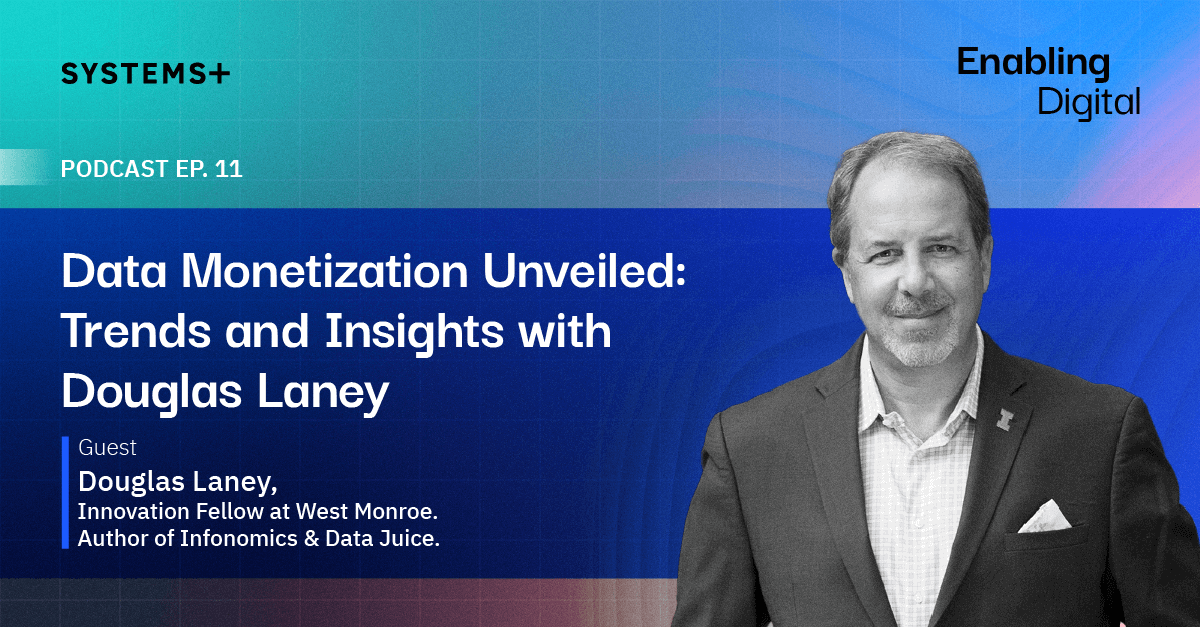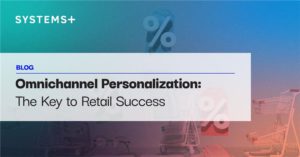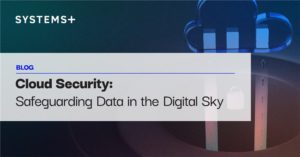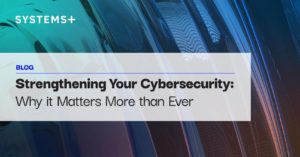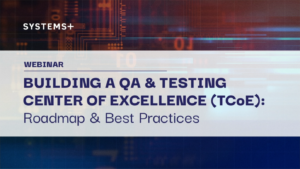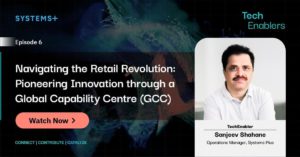Amay Jhaveri 0:10
Hey, everyone, and welcome to enabling digital with systems plus a podcast series. I'm super excited today to welcome Doug Laney, author of Infonomics, and currently an Innovation Fellow at West Monroe. Doug, welcome to the podcast.
Doug Laney 0:33
Thanks, Amay, and thanks to Systems Plus for hosting this excellent podcast series.
Amay Jhaveri 0:40
All right, so Doug, before we get started, it would be great. If we could understand more about why Infonomics, what led you to write that book, and your background overall?
Doug Laney 0:54
Yeah, So my background is I'm an Innovation Fellow with West Monroe's data engineering and analytics practice. And in my role, I help to develop new offerings around using data in innovative ways, monetizing data, valuing data, the kinds of things I think we'll talk about today. A lot of this dates back to my days at Gartner, I was a longtime Gartner analyst. And while I was there, I started researching the concept of data as an actual asset. And what that means or could mean to organizations and how we could be applying the things that we've learned about, about leveraging and managing other kinds of assets and how that could be applied to data. So in my role at West Monroe, I'm helping clients identify new and innovative ways to generate value from their data assets, beyond just building, you know, pretty pie charts and dashboards. And then how they can manage their data. Better, to enable that I started my career with Accenture. Back when it was Anderson Consulting, and have spent some time with some of the early AI software companies but most of my career has been with guests the bulk of my career has been with Gartner, where I was a senior analyst and helped establish the chief data officer research advisory practice there.
Amay Jhaveri 2:20
Awesome. And so you mentioned data being an asset. And I've heard your explanation of this on other podcasts. And I feel we need to kind of explain that again. Why do you believe data is fundamentally an asset? And yeah, let's start with that, actually.
Doug Laney 2:38
Yeah, I guess not to be, you know, entirely pedantic about it. But the definition of an asset is something that is, has three or four parts to it. One is that it's owned and or controlled by an entity. Two is that it's exchangeable for cash, and three is that it generates what accountants call probable future economic benefits that accrue to the entity that owns or controls it. The fourth one that's often thrown in also is that it's separable from other assets. And so I think it's perfectly clear that data meets, there's just no argument that data meets those criteria. And I guess it's just unfortunate that due to antiquated and arcane accounting practices, the accounting profession hasn't come around to acknowledging data as an asset, and neither has the insurance industry really come around to acknowledging data as property. Sure you can get cyber insurance, but you can't get insurance based on the value of the data asset itself. So basically the keepers have the definition of what constitutes an asset and what constitutes property. I guess more recently, I've even doubled down on their antiquated notions that it's neither, but I think I would argue that it clearly meets the criteria and therefore should be treated like one irrespective of what the accounting profession says.
Amay Jhaveri 4:00
Absolutely. And, I've heard this definition before. And you know, I think you hit the point, you had the hammer on the nail, data should be treated as an asset. But even if an organization now wants to start doing that, how, how would they even start, right? Where would they start as an organization to say, hey, I want to treat data as an asset. I think it's important, what do I do next?
Doug Laney 4:24
I think a lot of it starts with a couple of things. One is measuring it when we'll talk a little bit about various ways to measure data. But understanding what you have is, I guess, a prerequisite to even measuring it. So a lot of companies don't know what data they have. They don't have an accurate or ongoing inventory of their data assets. And I think job one and treating anything as an asset is establishing an inventory of what you have, what it means. Its lineage, all sorts of metadata around that, that asset, whether it's data or any other kinds of assets? So I think the first job is to understand what you have. The second is to measure its characteristics and contribution to value and cost basis.
Amay Jhaveri 5:12
All right. And so let's say I've cataloged my data, I've begun to measure it. I understand what data I have in my company and where it lies. How do I effectively use that data to then monetize it?
Doug Laney 5:26
Yeah, well, I think I'm telling I want to finish off maybe a thought on that last question, which is, you know, a lot of companies, companies already have well-honed asset management principles and practices that align to their own core products and services. So if you're a physical asset management company, perhaps you're following PAS 55, or the related ISO standard for managing your physical assets, if you're a financial asset, kind of company, you're probably following some standards and how to, and procedures on how to manage those financial assets. And if you're a services company, you probably are following some best practices and even some ISO standards on how to manage your human capital. And so I think that it makes sense to apply those kinds of concepts and principles and even practices to the way that you're managing data. And a reason to do that, not only is to manage your data better, but if you're a physical asset management company, near applying PAS 55 to the way that you're managing your physical assets, then you start as a data organization speaking the language of the business, in managing your data assets. And it's a way for data organizations to become closer to and collaborate better with the business. So I just wanted to kind of fill in the gap there. Let's move on to your next question. But can you repeat that again?
Amay Jhaveri 7:00
Yeah. So also, thank you for that. I, you know, I think doing the parallel data is an asset to you know, whether it's from manufacturing to equipment, even doing within our own companies, IT hardware, right, we, we have a lot of processes and governance around those, but I feel it fundamentally lacks when it comes to data, the amount of governance that we have. And so the next question was, okay, if I am actually truly able to establish better governance with my data, I really treated fundamentally as an asset, part of your thesis is that can also help to better monetization. And, you know, I just like to understand how we can bridge that once we sort of track data better.
Doug Laney 7:42
Yes, I started thinking about it, and I was writing the Infonomics book that you mentioned, thank you, for how to manage and measure and monetize data as an actual asset. So I started thinking about initially measuring data as an asset because the background on the concept of Infonomics, dates back to the 911 terror attacks, when, while I was at Gartner, some clients started contacting us, lamenting not only the tragic loss of life but also the loss of their data. And so they asked us to help value that data so they could submit claims to their insurers for the value of the data they lost. And it turns out that the insurers denied those claims, suggesting that data didn't constitute property and therefore wasn't covered by their property casualty policy. So that kind of got my attention, I got my iron up. And so I started thinking about why don't companies measure the value of their data, and I learned quickly that, you know, the accounting practices don't consider data and assets and in fact, after 911, the accounting profession, updated the key financial standards to prohibit the capitalization of data on balance sheets, or the recognition of data. And they made that change a month after 911. Actually, the accounting profession did it a couple of years after 911, the insurance practice updated a key standard prohibiting or excluding data from property-casualty policies, they did that a month after 911. So all that kind of got my attention. And, and I started thinking about, you know, irrespective of what the accounting profession and in the insurance industry, say, organizations should be managing their training data as an actual asset. And so that encompasses really three main things, managing it, measuring it, and monetizing it like like one. And the way this all fits together, is I think there's, you know, remember the old adage, you can't manage what you don't measure or you can't manage? Well, what you don't measure well, and I think that holds for data information as well, is that the companies that don't understand what data they have or measure its cost basis or its contribution to income or its quality indicators are really in a poor position to get the resources and budgets and support needed to manage data as an asset and then I think it follows that any asset that you're in at managing as an actual asset is one that you're not going to be able to monetize fully or optimally. And by monetize, we mean generating measurable economic benefits from so for many organizations, this is a vicious cycle of not measuring, therefore not managing, and therefore not monetizing their data as well as they could, or should. And the idea behind in Infonomics, and the work that we're doing at West Monroe is to help organizations kind of reverse that curse, as we say.
Amay Jhaveri 10:33
Awesome. And so so you know, talking about how companies sort of manage and measure data, and I'm getting a little deeper into that now thinking of data as an asset, I'm trying to think this, you know, take it to the complete extent to which you mentioned, I think we work a lot with sort of the IT departments in various companies. And, and there if you think of traditional IT, you've got your laptops and your hardware, as assets, fundamentally, and, and we've got departments literally that are built to set up the asset, track the asset, and if somebody leaves a company, call it back, all of those things. So now moving to data and treating data as an asset, what I guess is the version of that IT department, or what is the type of organization structure that you need, to sort of really get track and measure and manage data effectively.
Doug Laney 11:24
So I've been long have been an advocate of bifurcating the IT organization into separate I and T organizations to manage technology and information or data separately. There was a time, you know, back in the 60s 70s 80s 90s, maybe, where data and technology were inexorably connected and joined. But now today, we see with the advent of cloud capabilities, data warehouses and data lakes, and so forth, that it's entirely possible to decouple data from technology at every level of the organization. And so it just doesn't make a lot of sense anymore, to have an IT organization. And I think it makes more sense to have separate organizations to manage each of those assets, independently, but of course, collaboratively. So this has given rise to the CTO role, the Chief Data Officer role, or even the Chief Data Analytics Officer role in the office of the CTO. And so we help organizations set up those CTO offices, their operating models, and so forth, and help them separate from the IT organization. So, I think, from an organizational standpoint, another thing to discuss, I suppose, is that this organization needs really close alignment to the business. Ultimately, data is a business asset, not a technology asset, and should be managed by the business. So you mentioned data governance, and governance should be perhaps stood up by the data organization, but really should be led by and or at least heavily involved the business, the business organization. So those are kind of some thoughts that I have on that topic.
Amay Jhaveri 13:26
So that's super interesting, right? So in your mind, are you envisioning that it's sort of like there's a CDAO or CDO type role, and parallel to that person is the CIO, it's not, and they kind of working together under right or maybe the CEO in it,
Doug Laney 13:43
Right Or even, yeah, or even as we've seen with some organizations, they've realized that the CIO role may be superfluous. And what you need is a chief technology officer and a chief data officer. So we've seen companies like kidney names, but a pharmaceutical company or retailer, various government organizations that have taken that route and said, we really don't need a CDO. I'm sorry, a CIO, but rather a chief technology officer and a chief data officer. So regardless, I think the CIO and chief data officer should be peers. I think it's suboptimal when a Chief Data Officer role reports to the CIO and even worse, reports to the Chief Technology Officer.
Amay Jhaveri 14:29
Yeah, and then if both end up reporting to the CFO and you know, that's when it gets even more interesting, right? So when it comes to aligning with the business,
Doug Laney 14:37
and we've seen through some research that companies that maximize the better optimize the value of their data assets typically have a chief data officer, and not just any chief data officer would know, but an actual executive chief data officer with budgets and resources, rather than in what we call a CDO light, which is someone who typically will report to the CIO not really how budgets are, or their own resources, or a lot of autonomy.
Amay Jhaveri 15:12
Right. So you mentioned pharma, you mentioned retail, and you mentioned, you know, some people have seen success in these sorts of models. Could you sort of elaborate on maybe which industries, you've seen this trend working well in, and then maybe some success stories, of course, without naming any names, just how people have been able to make this happen?
Doug Laney 15:33
Certainly in retail, a lot of companies grocers in particular, Kroger is a great example actually spun off an entire data business. So retailers have long been capturing data about their inventory, their, their sales, shopping, and basket data, and making that available to their suppliers, or CPG suppliers and manufacturers. A great example of that is a company called Dollar General, which actually has a self-funding data warehouse or data lake, where they make data available to their CPG providers, not necessarily for cash, but for discounts or other kinds of commercial considerations. And I think this concept of having a self-funding data environment data Lake, data warehouse, whatever architecture you have, ought to be self-funding. And if it isn't self-funding, either one, you're not calculating, or measuring the impact that data is having on the top and bottom line, or you haven't been creative enough with how you're leveraging that data or externalizing it. So yeah, retailers have gotten pretty, pretty good at that. In the healthcare space, we're definitely seeing pharma’s and hospitals thinking about how to exchange their data with others in the research space in the academic space, in the pharma space, and even investors are very interested in healthcare-related data. I do so of course, in a de-identified way, but we're finding a lot of a lot of interest and a lot of success with organizations in the healthcare space. Pharma, hospitals, etc, monetizing, their data. Yeah, and I can share some, some, some stories, if you like, from my more recent book, the book is called Data Juice, and offer your listeners if any of your listeners would like copies of the book for their executive team, or management team, they should reach out to me and I can get you a deep discount on it and sign copies and whatever you like. So definitely reach out to me. Um, so some stories from the book, or actually some other stories that I have, I can't remember exactly. The book includes 101 examples of how organizations are leveraging data or squeezing value from their data. That's why it's called Data juice. And each of the stories is, is a real-world story and named organization. And each story is also accompanied by a commentary or analysis by one of 100 experts in the industry, CDs, Chief Data Officers, CIOs, academics, consultants, and people that I know who agreed to contribute to the book. So it's a really unique book that can be used to help inspire, or shame organizations(laughs) into doing more with their data. So some of the fun stories that I've compiled over the years, and I've actually compiled some 700 or so stories at this point. Some of my favorites include Lockheed Martin, you know, the manufacturer of mostly military equipment, planes, and so forth. They heard me speak a number of years ago at an event where I was talking about the concept of dark data, data that's unused, unused, or underutilized. And I suggested to someone in the audience who asked a question that, you know, they can analyze their emails to identify projects that were, you know, had some warning flags that were going sideways from a perspective of scope, or budget or personnel or had technology issues. And they could use that as a leading indicator of project issues, and get those early warning signs faster than the traditional method of, you know, typing up a status report and then sending it up the chain and so forth. And so Lockheed Martin went and took this idea. And they presented this at a Gartner event a few years ago, where they shared how they're analyzing all sorts of project documentation, including emails to identify issues with projects and they claim they have three times greater foresight and are saving hundreds of millions of dollars a year in cost overruns by using that method, so that's a great way of monetizing data. There's also a company called Vivint that makes security systems and they use some of the valuation models that I published in Infonomics, to identify opportunities to drive more value from their data throughout the business. And they came up with some two dozen ways to better share data throughout the business, leading to a $300 million market value boost to the business. Walmart's a great example Walmart realized that they had a great search engine for helping people find what they wanted online. But one week, there was a search term that was resulting in a really high degree of shopping cart abandonment. And that search term was the word house. And it was sending people to dog houses and doll houses and housing goods and so forth. And it wasn't at all what people were looking for. Turns out once they investigated it that folks were looking for the box DVD set or the ability to stream the medical drama house. And so what they realized was that their search engine wasn't taking into account social media, what was happening what was trending in the world. And so once they upgraded the search engine to do so they ended up reducing shopping cart abandonment across the board by about 10 to 15%, which in Walmart terms is like an extra billion dollars a year of sales. And then at West Monroe, we're working with, as I mentioned, hospitals and pharma’s and retailers to monetize their data, nothing I can particularly talk about, but in detail, but one particular Children's Hospital, we've identified nearly $100 million of annual recurring revenue from making their data or data products available externally. There's a pharmaceutical wholesaler that we've worked with, to do so. A manufacturer of major agricultural equipment. So, yeah, pretty easy to identify hundreds of millions of dollars a year of additional revenue or monetization opportunity from these clients, we have a pretty well-honed process for doing this that's kind of based on the Infonomics work that I published. And we've continued to refine that over the years.
Amay Jhaveri 22:19
Alright, so a lot to unpack in those stories. And, you know, I wish we had more time to dive into each of them. ( Yeah, no worries). But, you know, I, you know, so I'm stuck on two things. Well, one, the first one is a self-funding data warehouse, right, or self-funding data in itself. Sounds amazing. Feels like everybody should be doing it. But what, uh, I guess, what are some of the challenges that you see? And then, you know, my last question after that is going to go into this latest bout of AI and, you know, all the email analysis and all that fun stuff that you mentioned, I think there's, there's, it's even more powerful now. But you know, first, before we get into that, what, you know, self-funding data warehouse, the idea of monetizing your data in that manner, it sounds easy, but what are some of the big challenges that you see organizations facing?
Doug Laney 23:06
I think initially, when we talk about data monetization, people have in their heads that it's only about selling data. But we've identified a dozen or so patterns for generating measurable economic benefits from available data assets. And that's our definition of data monetization. So it doesn't necessarily have to be sold to be monetized data doesn't require an exchange of cash. And it can even go beyond your own data, you can monetize data that you can harvest from the interwebs or other sources. You don't have to just monetize raw data, you can monetize aggregate data, analysis, or reports. You don't have to be in the data business to monetize data. And another mental block is that organizations believe that due to privacy regulations, they can't monetize their customer data. And that just shows a lack of creativity. So a lot of the roadblocks kind of lead to a lack of creativity, innovation, or broad thinking around the various ways to generate economic benefits from data. But then once you get into it, there are a lot of challenges as well, like data monetization or creating data products is not a core business priority. There are a lot of mental blocks due to data not being recognized as an asset. There are legal, perceived, or even real, legal, regulatory, or ethical roadblocks to using data in particular ways. A lot of companies, particularly in retail are already giving away data for free. And so you kind of have to think about where you're going to cut that off and start offering more premium data products or data exchange services. A lot of companies have data quality issues that really limit their ability to externalize that data. Maybe they just don't have a culture of research and development to come up with ideas to monetize their data. And most organizations really lack organizational experience and skills to conceive design, implement, and sell market support, and data products. And so those are the things that we, West Monroe typically are helping our clients work through.
Amay Jhaveri 25:18
So you're saying it's not necessarily sort of technical challenges, but a lot of change management, that also comes into the picture when you're working with it
Doug Laney 25:28
Yea sure, I would say the change management issues are 80% of the issue technical is maybe 20%. Yeah.
Amay Jhaveri 25:37
Makes sense. And so finally dug, you know, generative AI chat GPT. You know, that's the latest trend right now. And you mentioned the right pieces of this where I feel AI would be helpful whether it's Lockheed Martin analyzing emails, potentially figuring out if a project is at risk, or Walmart not being able to keep up with social media trends. That in theory sounds like it's easier now with some of these AI tools. But how are you seeing sort of the impact of AI and data monetization and treating data as an asset? And that intersection?
Doug Laney 26:10
Yeah, great question. So I think that the world of generative AI opens up a world of possibilities for better leveraging unstructured content, like contracts and emails or customer support transcripts, and even podcast transcripts, right? In particular, I think they're really ripe for monetization using generative AI. Data science has really been mostly focused on structured data. But I think generative AI opens up the possibilities of analyzing and leveraging and monetizing unstructured content, even at some point, images and videos as well. And then, you know, we're also using generative AI internally to help catalyze data monetization ideation workshops, you know, we come into those now, not with a blank slate, but with an understanding of the industry issues, the challenges, the trends, the types of data, the opportunities to capitalize on data. And so we've developed a set of prompts to help us prepare for those workshops and, come and really hit the hitting the ground. We've also partnered with an early-stage company called Gulp Data that has developed its own AI capabilities to determine the market value of a data set and even generate a list of potential buyers. So we're excited about that partnership, and, and what can that can do for some of our clients. But yeah, I think generative AI is gonna open up a whole new world of possibilities for leveraging types of content that are often very latent in organizations.
Amay Jhaveri 27:53
Yeah, I mean, I'm, I'm super excited. I think we're just at the tip of the iceberg. And now it comes also down to that, that creativity that you mentioned, right? How creative can we get with the tools that we have and the data at our disposal? For sure. Well, that's all I have for today. Doug, thank you so much for joining us, and we hope to have you again soon. And I hope a lot of people reach out to you for Data Juice. I know I will.
Doug Laney 28:20
Thank you. Thanks so much. I really appreciate it. Thanks again.
